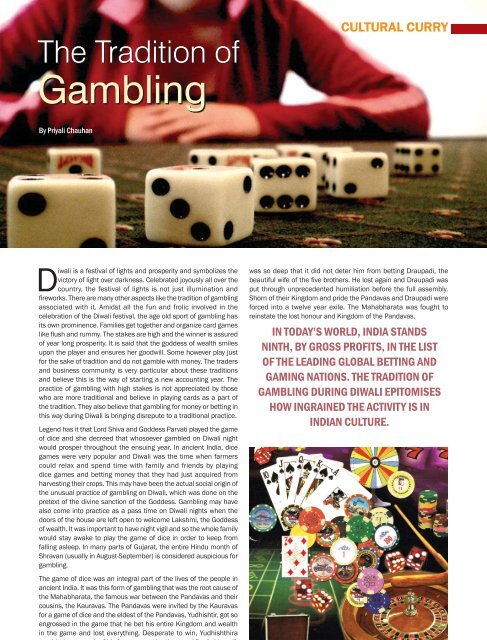to view Expat - LB Associates
to view Expat - LB Associates
to view Expat - LB Associates
You also want an ePaper? Increase the reach of your titles
YUMPU automatically turns print PDFs into web optimized ePapers that Google loves.
The Tradition of<br />
Gambling<br />
CULTURAL CURRY<br />
By Priyali Chauhan<br />
Diwali is a festival of lights and prosperity and symbolizes the<br />
vic<strong>to</strong>ry of light over darkness. Celebrated joyously all over the<br />
country, the festival of lights is not just illumination and<br />
fireworks. There are many other aspects like the tradition of gambling<br />
associated with it. Amidst all the fun and frolic involved in the<br />
celebration of the Diwali festival, the age old sport of gambling has<br />
its own prominence. Families get <strong>to</strong>gether and organize card games<br />
like fl ush and rummy. The stakes are high and the winner is assured<br />
of year long prosperity. It is said that the goddess of wealth smiles<br />
upon the player and ensures her goodwill. Some however play just<br />
for the sake of tradition and do not gamble with money. The traders<br />
and business community is very particular about these traditions<br />
and believe this is the way of starting a new accounting year. The<br />
practice of gambling with high stakes is not appreciated by those<br />
who are more traditional and believe in playing cards as a part of<br />
the tradition. They also believe that gambling for money or betting in<br />
this way during Diwali is bringing disrepute <strong>to</strong> a traditional practice.<br />
Legend has it that Lord Shiva and Goddess Parvati played the game<br />
of dice and she decreed that whosoever gambled on Diwali night<br />
would prosper throughout the ensuing year. In ancient India, dice<br />
games were very popular and Diwali was the time when farmers<br />
could relax and spend time with family and friends by playing<br />
dice games and betting money that they had just acquired from<br />
harvesting their crops. This may have been the actual social origin of<br />
the unusual practice of gambling on Diwali, which was done on the<br />
pretext of the divine sanction of the Goddess. Gambling may have<br />
also come in<strong>to</strong> practice as a pass time on Diwali nights when the<br />
doors of the house are left open <strong>to</strong> welcome Lakshmi, the Goddess<br />
of wealth. It was important <strong>to</strong> have night vigil and so the whole family<br />
would stay awake <strong>to</strong> play the game of dice in order <strong>to</strong> keep from<br />
falling asleep. In many parts of Gujarat, the entire Hindu month of<br />
Shravan (usually in August-September) is considered auspicious for<br />
gambling.<br />
The game of dice was an integral part of the lives of the people in<br />
ancient India. It was this form of gambling that was the root cause of<br />
the Mahabharata, the famous war between the Pandavas and their<br />
cousins, the Kauravas. The Pandavas were invited by the Kauravas<br />
for a game of dice and the eldest of the Pandavas, Yudhishtir, got so<br />
engrossed in the game that he bet his entire Kingdom and wealth<br />
in the game and lost everything. Desperate <strong>to</strong> win, Yudhishthira<br />
was so deep that it did not deter him from betting Draupadi, the<br />
beautiful wife of the fi ve brothers. He lost again and Draupadi was<br />
put through unprecedented humiliation before the full assembly.<br />
Shorn of their Kingdom and pride the Pandavas and Draupadi were<br />
forced in<strong>to</strong> a twelve year exile. The Mahabharata was fought <strong>to</strong><br />
reinstate the lost honour and Kingdom of the Pandavas.<br />
IN TODAY’S WORLD, INDIA STANDS<br />
NINTH, BY GROSS PROFITS, IN THE LIST<br />
OF THE LEADING GLOBAL BETTING AND<br />
GAMING NATIONS. THE TRADITION OF<br />
GAMBLING DURING DIWALI EPITOMISES<br />
HOW INGRAINED THE ACTIVITY IS IN<br />
INDIAN CULTURE.






